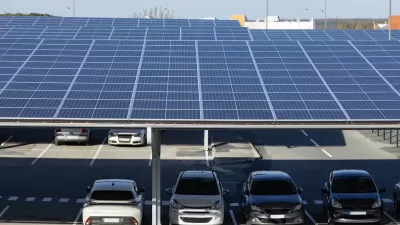While Florida may well determine who becomes the next president, renewable energy advocates are worried about a measure on the ballot that will have far-reaching effects on solar power should it pass.

"The ballot initiative, Amendment 1, would change the state constitution to guarantee that electricity consumers who don’t have home solar panels won’t have to 'subsidize' those who do," reports Ben Adler, who covers environmental policy and politics for Grist.
It’s actually an effort by the utility industry to protect its profit margins, but it’s being misleadingly presented as an amendment to promote solar. And the con has worked: Many Florida voters who want to see more solar power have been supporting it.
The measure was proposed as a response to what utility advocates expected to be a forthcoming initiative proposed by "Floridians for Solar Choice — a collaboration between such disparate groups as the Christian Coalition, the Tea Party Network, the League of Women Voters, and the Sierra Club — launched in January 2015 with the intent of repealing Florida’s prohibition on sales of energy by anyone other than the existing utility monopolies," explains Adler.
That policy, which exists in only three other states, prevents rooftop solar leasing companies like SolarCity and Sunrun from entering the Florida market.
Fewer than 20,000 homes have solar panels in the Sunshine State, whereas New York, with a similar population, has 108,000 homes with solar.
Their strategy turned out to be better than they thought. Their measure will appear on the ballot without the measure they feared.
The utility front group made that even harder for Floridians for Solar Choice by soaking up the signatures of pro-solar voters, sowing confusion, and snatching up all the paid signature gatherers with high wages.
[Steve Smith, executive director of the Southern Alliance for Clean Energy, a clean energy advocacy organization, and a board member of Floridians for Solar Choice] and his colleagues were left with little choice but to abandon their initiative and combat Amendment 1, although they also succeeded in eliminating the property tax penalties for owning your own rooftop solar — which they got onto the August primary ballot, and which passed.
Adler goes on to describe how net metering, which would require utilities to pay those with solar panels the retail rate for the electricity they generate, plays in the amendment as well as the benefits of increasing distributed solar power.
Solar advocates fear that if Amendment 1 passes in Florida, it will make it easier for the state to roll back net metering or otherwise discourage rooftop solar.
As managing editor James Brasuel wrote in an earlier, related post on the topic, "Planetizen has provided ongoing coverage of net metering and the ongoing battle between distributed solar power and traditional electric utilities."
Hat tip to Katie Herzog
FULL STORY: Will Florida’s voters be fooled into passing an anti-solar amendment?

Planetizen Federal Action Tracker
A weekly monitor of how Trump’s orders and actions are impacting planners and planning in America.

Maui's Vacation Rental Debate Turns Ugly
Verbal attacks, misinformation campaigns and fistfights plague a high-stakes debate to convert thousands of vacation rentals into long-term housing.

San Francisco Suspends Traffic Calming Amidst Record Deaths
Citing “a challenging fiscal landscape,” the city will cease the program on the heels of 42 traffic deaths, including 24 pedestrians.

Amtrak Rolls Out New Orleans to Alabama “Mardi Gras” Train
The new service will operate morning and evening departures between Mobile and New Orleans.

The Subversive Car-Free Guide to Trump's Great American Road Trip
Car-free ways to access Chicagoland’s best tourist attractions.

San Antonio and Austin are Fusing Into one Massive Megaregion
The region spanning the two central Texas cities is growing fast, posing challenges for local infrastructure and water supplies.
Urban Design for Planners 1: Software Tools
This six-course series explores essential urban design concepts using open source software and equips planners with the tools they need to participate fully in the urban design process.
Planning for Universal Design
Learn the tools for implementing Universal Design in planning regulations.
Heyer Gruel & Associates PA
JM Goldson LLC
Custer County Colorado
City of Camden Redevelopment Agency
City of Astoria
Transportation Research & Education Center (TREC) at Portland State University
Jefferson Parish Government
Camden Redevelopment Agency
City of Claremont





























